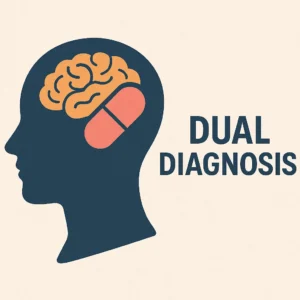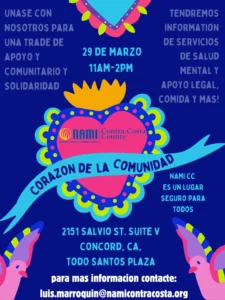Written by Isabella Pacho, a NAMI CC 2025 Summer Intern.
What alternatives to incarceration exist for individuals who are impacted by mental illness, such as peers? This post explores options and pathways to support wellness outside of the prison system.
Jails and prisons were never meant to act as mental health facilities, yet today they contain more people who have mental illnesses than psychiatric hospitals. Throughout the United States, individuals are placed into incarceration systems with behaviors that are symptoms of untreated mental illnesses but are mistaken for criminal intent. The incarceration system fails to acknowledge the burden this has on law enforcement, the punishment of an individual’s vulnerability, and the lack of promoting rehabilitation. With this flawed system comes advocacy and change. However, alternatives to incarceration are growing, prioritizing treatment over punishment. Examples include crisis response teams, peer-led programs, and mental health courts in this growing movement. In this post, I will discuss how mental health intersects with the criminal “injustice” system and alternatives to healing over handcuffs.
Mental Health Intervention Services
There are two alternatives to incarceration within Mental Health Intervention Services. One alternative is Crisis Response Teams, also known as CRTs. This is a specialized unit that offers a health over law enforcement approach to intervention and responding to mental health emergencies. Those involved include a team of Peer Support Specialists (PSS), Mental Health Specialists, EMTs, and more. This group of trained specialists handle de-escalation and trauma informed care as opposed to use of force and/or arrests.
Another alternative to incarceration is Diversion Programs, also considered Pre-Arrest. Diversion Programs serve as an alternative to arrests, where law enforcement redirects individuals to support services. In fact, people who are having a mental health crisis do not have an intent to commit a crime but have unmet mental health needs. Supportive services include treatment of mental health symptoms, recovery programs (substance use), peer support, housing support, and case management.
The goal of Mental Health Intervention Services is to not charge someone, and if charged, drop the charge should their selected program be completed. Though designed with good intent, these Mental Health Intervention Service programs are still a work in progress. Some areas where I think they could be improved include expanding services to 24/7 care, integrating cultural competence and language access, funding for training, linking between 911 and 988 lines to dispatchers, opening up access to more location services, and integrating consistent police discretion training.
According to the San Francisco District Attorney’s Office, “Diversion was found to be particularly effective for people charged with felony drug sales and violent crimes. People charged with drug sales were 19.9% less likely to recidivate and people charged with violent crimes were 17.5% less likely to recidivate after two years…Young people who completed the program were 66% less likely to recidivate after 3 years.” [12] Mental Health Intervention Services are useful because these interventions result in less jail overcrowding, improvement of public health and safety, reduced incarceration for mental illness, trust between law enforcement and marginalized communities, decreased repeat offenses, and treatment is cheaper than incarceration.
Rehabilitation Programs
More jurisdictions are realizing that mental illness is a health issue and not a crime. Because of this, Mental Health Courts are on the rise. These are specialized problem solving courts focused on keeping individuals out of jail and into supervised treatment plans. They still address the root cause of criminal behavior and hold the individual accountable, which often supports an individual with an untreated mental health disorder or illness getting the help, support, or treatment they need.
To be eligible to partake in mental health court, there are a few criteria needed. The first two criteria: one, an individual must be diagnosed with a serious mental illness, and two, they must be facing a non-violent misdemeanor or felony charge. On the other hand, the last two criteria are as follows: the individual must voluntarily agree to participate in the program, or there must be a clear connection between their mental health condition and the offense. During the court process, a team of mental health professionals, prosecutors, public defenders, a judge, case specialists, and sometimes Peer Support Specialists are present during trial. The individual is given a court-ordered treatment plan. If the individual completes and graduates from their plan, they could be granted a reduction or dismissal of charges, no incarceration, or even a sealed or expunged record.
Some benefits to mental health courts include instead of punishment, individuals are offered treatment options, promoting recovery and stability. There is a reduction in recidivism, which is returning to jail or prison. Individuals save money in court and long-term costs of jail. Plus, individuals are seen as humans, not just an offender with a number. However, there are limitations to this service. First, there are a limited number of jurisdictions that offer mental health courts, and those that do have limited capacity. Individuals with prior offenses are excluded from these courts. Clinical expectations and court rules are difficult to navigate for many who are not familiar with the system. Additionally, race and socioeconomic background affects access to mental health courts. Studies from the Consulting Psychology Journal finds that “Black and Latinx defendants are less likely to be referred to or accepted into mental health courts compared to white defendants, even when controlling for diagnosis and offense type” (Finkelman & Lopez, 2012).
Community Housing Services and Support Groups
Community-Based Treatment is offering mental health services to individuals residing in non-clinical settings, such as drop in centers or outpatient clinics. Supportive Housing offers affordable housing with mental health services, such as peer support, psychiatric care and therapy, substance use counseling, support in education and employment, and training through life skills. These approaches break the vicious cycle of recidivism, offering a long term alternative to housing stability and mental health services within local communities. Such services stop the “revolving door” effect where individuals cycle through the pattern of arrest, incarceration, and homelessness.
Factors that limit community-based treatment services from being offered include having limited access to housing and being placed on a waitlist. Funding is also an issue, as is the stigma and oppression around individuals with a criminal history.
For the future, I would suggest a track system where individuals can be placed in community based treatment and supportive housing as a route from mental health courts or jails and prisons. Peer Support Specialists are making the field of mental health transformative. These are individuals who have lived experience within incarceration, substance use, and mental illness and are trained to support individuals who are struggling with similar challenges as them. The services they offer are non-clinical and are built on a relationship of mutual respect, empathy, and trust. These individuals are essential to connecting with those who need mental health support and guidance in a system that oppresses them and doesn’t make it easy for them to have access to services.
Technology Based Interventions
A technological way of receiving psychiatric and/or therapy services is through Telehealth and Virtual Therapy. These services are useful for incarcerated individuals who have been recently released from jails or prisons and are going through court proceedings. Accessing Telehealth reduces the stigma of receiving mental health treatment, reduces costs of transportation to a clinic, and beats the clinical wait time lines. Individuals can receive these services through video calls, phone calls, and secure messaging. For example, an incarcerated individual who has a mental illness is attending mental health court. That individual can join their therapy sessions online and wouldn’t have to miss any of their in-person appointments and deadlines.
Another alternative to incarceration is Electronic Monitoring, such as ankle monitors. Incarcerated individuals are supervised through GPS tracking, while still being able to hold some freedoms within a radius.
One more alternative I would like to highlight are Hot Lines and Warm Lines, which are great for diverting individuals’ needs away from law enforcement and toward mental health care. Crisis Hotlines offer immediate support to individuals 24/7 and are composed of crisis counselors and trained professionals. The 988 Suicide and Crisis Lifeline is a nationwide service used throughout the United States. Warmlines are non-emergency phone calls that offer support to individuals who speak to a trained Peer Support Specialist before a crisis happens. A trained PSS offers emotional support, active listening, and resources. An example of this is NAMI Contra Costa’s Warmline, which offers support and resources to the Contra Costa community. To access NAMI Contra Costa’s office, call (925) 942-0767.
Conclusion/Takeaways
The criminal legal system has become the largest mental health provider in the U.S., often punishing individuals for untreated symptoms rather than offering support. In response, communities are embracing alternatives that prioritize care over incarceration. Programs like crisis response teams, pre-arrest diversion, and mental health courts focus on treatment, accountability, and recovery instead of jail time. Community-based treatment, supportive housing, and peer-led services offer long-term stability and help break the cycle of recidivism. Technology-based tools like telehealth, electronic monitoring, and hotlines further expand access to timely and compassionate care. While challenges like limited funding, access, and stigma remain, these approaches reflect a growing shift toward a more humane, health-centered justice system. With continued investment and reform, we can create a future where people receive the help they need–not handcuffs. NAMI Contra Costa is involved in supporting mental health treatment over incarceration by showing support in the community; attending local court hearings and trials for individuals in the community when injustice is present. I advocate that people should join us to advocate for decriminalizing mental health care because no one should be punished for experiencing a mental illness; instead, they deserve compassion, support, and access to treatment.
Sources
- https://namicontracosta.org/
- https://www.988california.org/
- https://www.cchealth.org/get-care/a3-crisis-response
- https://www.nami.org/criminal-justice-and-legal/people-need-help-not-handcuffs-mental-illness-and-the-criminal-justice-system/
- https://www.nami.org/advocate/how-the-justice-system-fails-those-with-mental-illness/
- https://www.nami.org/988/criminal-justice-reform-means-reforming-the-mental-health-system/
- https://www.nami.org/advocate/all-people-deserve-quality-care-including-those-who-are-incarcerated/
- https://telehealth.hhs.gov/
- https://www.csh.org/
- https://www.uscourts.gov/…/how-location-monitoring-works
- https://courts.ca.gov/…/mental-health-courts
- https://sfdistrictattorney.org/…/Diversion-Factsheet.pdf
- https://psycnet.apa.org/doiLanding?doi=10.1037%2Fa0031675


